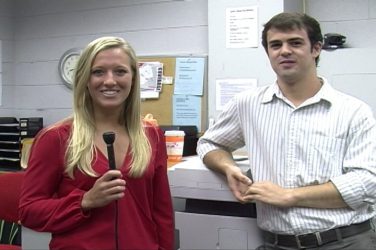Students in Georgia are looking for ways to save the environment as their state’s CO2 emission reduction efforts head in the wrong direction.
Dana Theoc, a former University of Georgia Office of Sustainability intern, has chosen to get involved and currently works for the Swap Shop, a free thrift store on UGA’s campus that promotes the reuse and cycling of items instead of buying new ones which prevents goods from entering landfills.
“I think there is a lot more [Georgia] can do,” Theoc said. “I understand that it’s a very scary prospect, and it’s scary to think about potentially changing your life to adjust to this new climate, but there’s so much more in terms of policy especially that can be done.”
Involvement from Gen Z comes at a critical time, as Georgia’s CO2 emissions saw a 6% increase from 2020 to 2021 according to the United States Energy Information Department. Georgia’s CO2 emissions now sits at 124.1 million metric tons a year, a 70% increase from 1970.
According to NPR, 60% of people aged 18 to 29 believe climate change should be a priority, even at the risk of slowing economic growth.
However, not all students feel they are informed enough on how to get involved or who to reach out to. Isabel Covington, a student at UGA, says she is aware of a couple of environmental groups existing on campus but struggles to discover their names and contact information.
Theoc believes informing students is half the battle in getting young people involved.
“There’s definitely more that [UGA] could do to push students to get involved,” Theoc said. “I think any type of involvement is good, but sustainability involvement that you get to connect with a cool community. We’re all trying to make the world better so that’s particularly special.”
Paths to Sustainable Involvement
The University of Georgia’s Office of Sustainability brings environmentally-friendly shopping to the middle of campus. Each Wednesday, the Farm-to-Campus farmer’s market tent sells various produce and locally grown food in the Tate courtyard to students and professors.
Products include flower bouquets, eggplants, honey, tea leaves, peppers and cilantro.
Clarissa Hane, an ecology student at UGA, purchased products from Farm-to-Campus then began working at the table occasionally. Then, she served as the student president at the Office of Sustainability, where she is now a paid intern. She explained the local sourcing of the table’s many products.
“The flowers are from this local shop — this lady, she just grows them in her backyard, and she, like, sells them at the Athens Farmers Market,” Clarissa said. “The flowers, it’s also just what the woman is growing. But we’ve had marigolds and zinnias.”
Peppermint tea, Tulsi tea and garden produce is “dependent on what’s in season, so it’ll change weekly,” and sourced from UGArden, a student-run campus garden. Both UGArden and Farm-to-Campus are subgroups of the Office of Sustainability’s “Sustainable UGA” initiative, which has worked to engage the college-aged and Athens community in environmentally-positive practices since 2008.
The Athens community is not just integrated into the educational experience of the garden, but also in the impact. All of the food grown at UGArden is donated to different community organizations that support families facing food insecurity.
“We are donating everything that we grow. I think another huge mission of UGArden is to support the community in multiple facets. So, that’s education and then actually giving food back,” said Allie Johnston, volunteer and outreach coordinator for UGArden.
The majority of UGArden’s food is given to Campus Kitchen, a student-run organization at UGA dedicated to providing hunger relief and minimizing food waste. Campus Kitchen packages UGArden produce, and food that would otherwise be wasted, then delivers to clients in need.
The rest of UGArden’s food is distributed among other community programs such as the Student Farmers Market at the Tate Student Center and a weekly food drive at Covenant Presbyterian Church.
In addition to providing food to families in need, UGArden also operates on a pillar of sustainable farming.
“Here at UGArden we are trying to do things as sustainable as we think we can do it, so, for us, that means organic practices. The pesticides and herbicides and fertilizers that we use, there are no chemicals in them. They are all derived from an organic and natural substance,” said Johnston.
They continue to uphold their original mission to foster education by teaching others about these organic practices. UGArden offers a variety of experiential learning classes, allowing students to maintain their own plots, learn the principles of agricultural systems, and gain knowledge of organic farming practices. These classes also bring more volunteers to the garden and help students discover a passion for sustainable farming.
“I actually had to volunteer for a class, HORT 3330E, but I’ve lived in Athens my whole life so I’ve known about UGArden for forever, and I’m excited to help with the harvest and see how things work around here,” said Grace Cochran, a biological sciences major and UGArden volunteer.
Mia Simmons, Griffin Akers, Caroline Batson, Saniah Sion Pharms are students majoring in journalism at Grady College of Journalism and Mass Communication at the University of Georgia.















Show Comments (0)